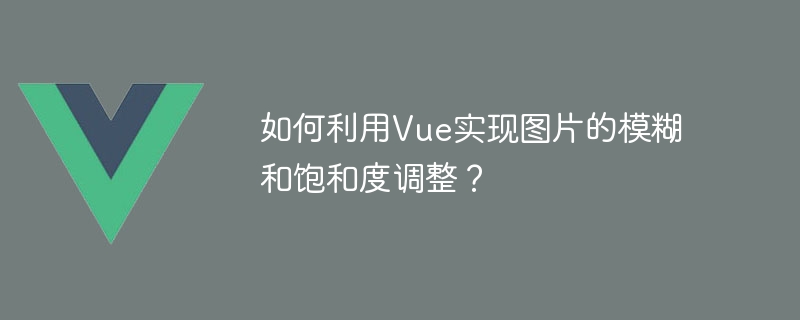

How to use Vue to adjust the blur and saturation of images?
Vue.js is a progressive JavaScript framework for building user interfaces. Its simplicity, ease of use and rich features make it the first choice for developers. In this article, we will explore how to use Vue.js to implement blur and saturation adjustment functions for images.
First, we need to have a picture to be processed. Suppose we already have an image file named "image.jpg". In the Vue component, we can use HTML's <img src="/static/imghw/default1.png" data-src="imageUrl" class="lazy" alt="How to use Vue to adjust the blur and saturation of images?" > tag to display images, and use Vue's "data" attribute to save the image path.
<template>
<div>
<img src="/static/imghw/default1.png" data-src="imageUrl" class="lazy" : alt="image" />
</div>
</template>
<script>
export default {
data() {
return {
imageUrl: 'image.jpg',
};
},
};
</script>Next, we need to introduce a JavaScript library for processing image effects. In this article, we will use the "pica" library to implement image blur and saturation adjustment functions. It can be installed through npm and then introduced in the Vue component.
npm install pica
import pica from 'pica';
export default {
// ...
methods: {
async blurImage() {
const img = new Image();
img.src = this.imageUrl;
const canvas = document.createElement('canvas');
const ctx = canvas.getContext('2d');
// 调整画布尺寸与图片一致
canvas.width = img.width;
canvas.height = img.height;
// 在画布上绘制图片
ctx.drawImage(img, 0, 0);
// 应用模糊效果
const picaResizer = pica();
const blurredImage = await picaResizer.resize(canvas, canvas, { blur: 5 });
// 将模糊后的图片展示在<img src="/static/imghw/default1.png" data-src="imageUrl" class="lazy" alt="How to use Vue to adjust the blur and saturation of images?" >标签中
this.imageUrl = blurredImage.toDataURL();
},
async adjustSaturation() {
const img = new Image();
img.src = this.imageUrl;
const canvas = document.createElement('canvas');
const ctx = canvas.getContext('2d');
// 调整画布尺寸与图片一致
canvas.width = img.width;
canvas.height = img.height;
// 在画布上绘制图片
ctx.drawImage(img, 0, 0);
// 应用饱和度调整
const picaResizer = pica();
const adjustedImage = await picaResizer.resize(canvas, canvas, { saturation: 0.5 });
// 将调整后的图片展示在<img src="/static/imghw/default1.png" data-src="imageUrl" class="lazy" alt="How to use Vue to adjust the blur and saturation of images?" >标签中
this.imageUrl = adjustedImage.toDataURL();
},
},
};In the above example code, we defined two methods blurImage and adjustSaturation. Both methods use the pica library to process images. The blurImage method applies the blur effect by drawing the image on the canvas and using the resize method provided by the pica library. The adjustSaturation method adjusts the image effect by adjusting the saturation of the image.
Finally, we can add some buttons to the Vue template to trigger these methods.
<template>
<div>
<img src="/static/imghw/default1.png" data-src="imageUrl" class="lazy" : alt="image" />
<button @click="blurImage">应用模糊效果</button>
<button @click="adjustSaturation">调整饱和度</button>
</div>
</template>Through the above steps, we can adjust the blur and saturation of the image in the Vue application. This is just a simple example, you can make more adjustments and extend it according to your needs.
Summary: This article uses Vue.js and pica library to implement the blur and saturation adjustment functions of images. Using Vue's data binding and methods, as well as the image processing methods provided by the pica library, we can easily adjust the image effects. Hope this article can be helpful to you!
The above is the detailed content of How to use Vue to adjust the blur and saturation of images?. For more information, please follow other related articles on the PHP Chinese website!